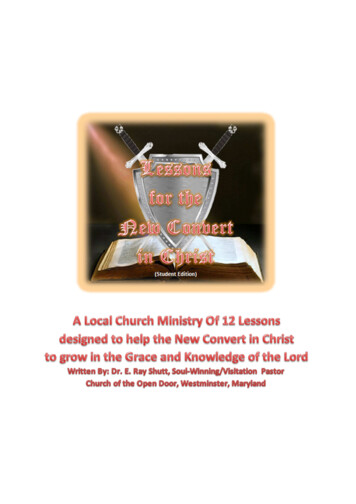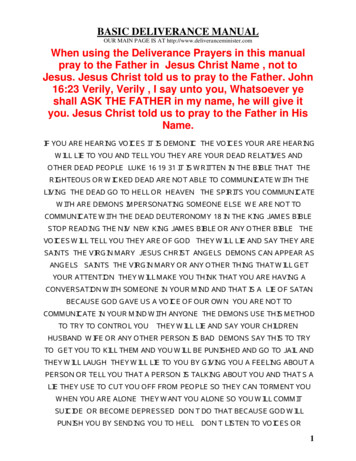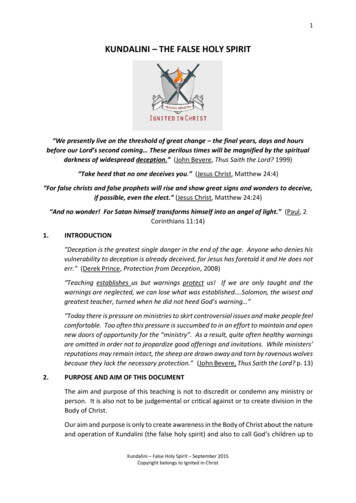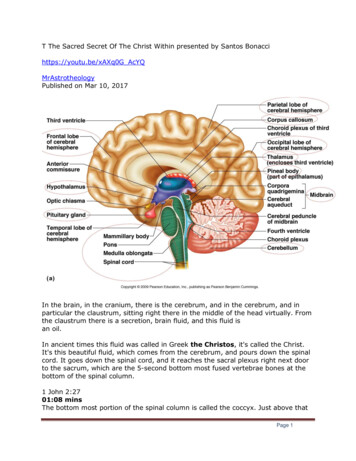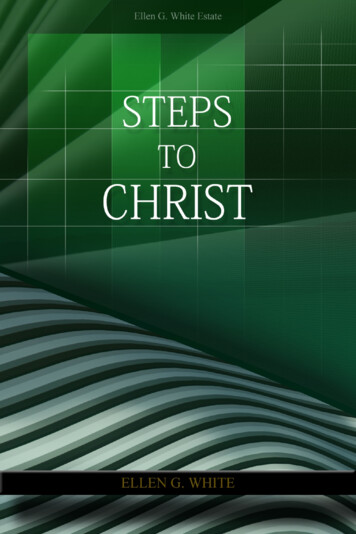
Transcription
Steps to ChristEllen G. White1892
Information about this BookOverviewThis ePub publication is provided as a service of the Ellen G.White Estate. It is part of a larger collection. Please visit the EllenG. White Estate website for a complete list of available publications.About the AuthorEllen G. White (1827-1915) is considered the most widelytranslated American author, her works having been published inmore than 160 languages. She wrote more than 100,000 pages ona wide variety of spiritual and practical topics. Guided by the HolySpirit, she exalted Jesus and pointed to the Scriptures as the basis ofone’s faith.Further LinksA Brief Biography of Ellen G. WhiteAbout the Ellen G. White EstateEnd User License AgreementThe viewing, printing or downloading of this book grants youonly a limited, nonexclusive and nontransferable license for usesolely by you for your own personal use. This license does not permitrepublication, distribution, assignment, sublicense, sale, preparationof derivative works, or other use. Any unauthorized use of this bookterminates the license granted hereby. Copyright 2010 by the Ellen G. White Estate, Inc.For more information about the author, publishers, or how youcan support this service, please contact the Ellen G. White Estate:(email address). We are thankful for your interest and feedback andwish you God’s blessing as you read.
ContentsInformation about this Book . . . . .Overview . . . . . . . . . . . .About the Author . . . . . . . .Further Links . . . . . . . . . .End User License Agreement . .Foreword . . . . . . . . . . . . . . .Table of Contents . . . . . . . . . . .Chap. 1 - God’s Love for Man . . . .Chap. 2 - The Sinner’s Need of ChristChap. 3 - Repentance . . . . . . . . .Chap. 4 - Confession . . . . . . . . .Chap. 5 - Consecration . . . . . . . .Chap. 6 - Faith and Acceptance . . . .Chap. 7 - The Test of Discipleship . .Chap. 8 - Growing Up Into Christ . .Chap. 9 - The Work and the Life . . .Chap. 10 - A Knowledge of God . . .Chap. 11 - The Privilege of Prayer . .Chap. 12 - What to Do with Doubt . .Chap. 13 - Rejoicing in the Lord . . .1.1.1.1.1.5.7.9. 17. 23. 37. 43. 49. 57. 67. 77. 85. 93. 105. 115
4
ForewordFew books attain a distribution reckoned in millions or exert sogreat an influence in the uplifting of humanity as has Steps to Christ.In countless editions, this little volume has been printed in more thanseventy languages, bringing inspiration to hundreds of thousands ofmen and women throughout the world, even those who dwell inthe remote corners of the earth. From the appearance of the firstedition in 1892, the publishers have been called upon to add printingto printing to meet the immediate and sustained demand from thereading public.The author of this work, Ellen G. White (1827-1915), wasa religious speaker and writer, well known on three continents.Born near Portland, Maine, she spent her early life in the NewEngland States, and then her travels and labors led her to the rapidlyexpanding central and western areas of the United States. Theyears 1885 to 1887 she devoted to work in the leading countries ofEurope, where she often addressed large audiences, and continuedher writing. Subsequently she spent nine active years in Australiaand New Zealand. From her pen have come forty-five volumes, largeand small, in the fields of theology, education, health, and the home,and practical Christianity, several with a distribution exceeding themillion-copy mark. Of these, Steps to Christ is the most popular andwidely read.The title of the book tells its mission. It points the5
Reader to Jesus Christ as the only one who is able to meet theneeds of the soul. It directs the feet of the doubting and halting tothe pathway of peace. It leads the seeker after righteousness andwholeness of character, step by step, along the way of Christianliving, to that experience where he can know the fullness of blessingwhich is found in the complete surrender of self. It reveals to him thesecret of victory as it unfolds in simplicity the saving grace and thekeeping power of the great Friend of all mankind.This edition marks a forward step in standardizing the paging ofthe book in forthcoming English-language printings. With no changein the text, but with a format, spelling, and capitalization in keepingwith the times, this little compendium of devotion will continue onits mission, but now in such form, regardless of the size of the typeor page, as to conform to the new Index to the writings of Ellen G.White.Jacob of old, when oppressed with the fear that his sin had cuthim off from God, lay down to rest, and “he dreamed, and behold aladder set up on the earth, and the top of it reached to heaven.” Theconnection between earth and heaven was thus revealed to him, andwords of comfort and hope were spoken to the wanderer by Him whostood at the top of the shadowy stairs. That the heavenly vision maybe repeated to many as they read this story of the way of life, is thesincere wish of the publishers, and—The Trustees of theEllen G. White Publications6
Table of ContentsGod’s Love for Man9The Sinner’s Need of handAcceptance49The Test of Discipleship57Growing up Into Christ67The Work and the Life77A Knowledge of God85The Privilege of Prayer93What to Do With Doubt105Rejoicing in the Lord1157
8
Chap. 1 - God’s Love for ManNature and revelation alike testify of God’s love. Our Father inheaven is the source of life, of wisdom, and of joy. Look at thewonderful and beautiful things of nature. Think of their marvelousadaptation to the needs and happiness, not only of man, but of allliving creatures. The sunshine and the rain, that gladden and refreshthe earth, the hills and seas and plains, all speak to us of the Creator’slove. It is God who supplies the daily needs of all His creatures. Inthe beautiful words of the psalmist—“The eyes of all wait upon Thee;And Thou givest them their meat in due season.Thou openest Thine hand,And satisfiest the desire of every living thing.”Psalm 145:15, 16.God made man perfectly holy and happy; and the fair earth, asit came from the Creator’s hand, bore no blight of decay or shadowof the curse. It is transgression of God’s law—the law of love—thathas brought woe and death. Yet even amid the suffering that resultsfrom sin, God’s love is revealed. It is written that God cursed theground for man’s sake. Genesis 3:17. The thorn and the thistle—thedifficulties and trials that make his life one of toil and care—wereappointed for his good as a part of the training needful in God’s planfor his uplifting from the ruin and degradation that sin has wrought.The9
world, though fallen, is not all sorrow and misery. In nature itself aremessages of hope and comfort. There are flowers upon the thistles,and the thorns are covered with roses.“God is love” is written upon every opening bud, upon everyspire of springing grass. The lovely birds making the air vocal withtheir happy songs, the delicately tinted flowers in their perfectionperfuming the air, the lofty trees of the forest with their rich foliageof living green—all testify to the tender, fatherly care of our God andto His desire to make His children happy.The word of God reveals His character. He Himself has declaredHis infinite love and pity. When Moses prayed, “Show me Thyglory,” the Lord answered, “I will make all My goodness pass beforethee.” Exodus 33:18, 19. This is His glory. The Lord passedbefore Moses, and proclaimed, “The Lord, The Lord God, mercifuland gracious, long-suffering, and abundant in goodness and truth,keeping mercy for thousands, forgiving iniquity and transgressionand sin.” Exodus 34:6, 7. He is “slow to anger, and of greatkindness,” “because He delighteth in mercy.” Jonah 4:2; Micah 7:18.God has bound our hearts to Him by unnumbered tokens inheaven and in earth. Through the things of nature, and the deepestand tenderest earthly ties that human hearts can know, He has soughtto reveal Himself to us. Yet these but imperfectly represent Hislove. Though all these evidences have been given, the enemy of goodblinded the minds of men, so that they looked upon God with fear;they thought of10
Him as severe and unforgiving. Satan led men to conceive of God asa being whose chief attribute is stern justice,—one who is a severejudge, a harsh, exacting creditor. He pictured the Creator as a beingwho is watching with jealous eye to discern the errors and mistakesof men, that He may visit judgments upon them. It was to removethis dark shadow, by revealing to the world the infinite love of God,that Jesus came to live among men.The Son of God came from heaven to make manifest the Father.“No man hath seen God at any time; the only begotten Son, whichis in the bosom of the Father, He hath declared Him.” John 1:18.“Neither knoweth any man the Father, save the Son, and he towhomsoever the Son will reveal Him.” Matthew 11:27. When one ofthe disciples made the request, “Show us the Father,” Jesus answered,“Have I been so long time with you, and yet hast thou not known Me,Philip? He that hath seen Me hath seen the Father; and how sayestthou then, Show us the Father?” John 14:8, 9.In describing His earthly mission, Jesus said, The Lord “hathanointed Me to preach the gospel to the poor; He hath sent Meto heal the brokenhearted, to preach deliverance to the captives,and recovering of sight to the blind, to set at liberty them that arebruised.” Luke 4:18. This was His work. He went about doing goodand healing all that were oppressed by Satan. There were wholevillages where there was not a moan of sickness in any house, forHe had passed through them and healed all their sick. His work gaveevidence of His divine anointing. Love, mercy, and compassion wererevealed in every act of11
His life; His heart went out in tender sympathy to the children ofmen. He took man’s nature, that He might reach man’s wants. Thepoorest and humblest were not afraid to approach Him. Even littlechildren were attracted to Him. They loved to climb upon His kneesand gaze into the pensive face, benignant with love.Jesus did not suppress one word of truth, but He uttered italways in love. He exercised the greatest tact and thoughtful, kindattention in His intercourse with the people. He was never rude,never needlessly spoke a severe word, never gave needless pain toa sensitive soul. He did not censure human weakness. He spokethe truth, but always in love. He denounced hypocrisy, unbelief,and iniquity; but tears were in His voice as He uttered His scathingrebukes. He wept over Jerusalem, the city He loved, which refusedto receive Him, the way, the truth, and the life. They had rejectedHim, the Saviour, but He regarded them with pitying tenderness. Hislife was one of self-denial and thoughtful care for others. Every soulwas precious in His eyes. While He ever bore Himself with divinedignity, He bowed with the tenderest regard to every member of thefamily of God. In all men He saw fallen souls whom it was Hismission to save.Such is the character of Christ as revealed in His life. This isthe character of God. It is from the Father’s heart that the streamsof divine compassion, manifest in Christ, flow out to the children ofmen. Jesus, the tender, pitying Saviour, was God “manifest in theflesh.” 1 Timothy 3:16.12
It was to redeem us that Jesus lived and suffered and died. Hebecame “a Man of Sorrows,” that we might be made partakers ofeverlasting joy. God permitted His beloved Son, full of grace andtruth, to come from a world of indescribable glory, to a worldmarred and blighted with sin, darkened with the shadow of deathand the curse. He permitted Him to leave the bosom of His love, theadoration of the angels, to suffer shame, insult, humiliation, hatred,and death. “The chastisement of our peace was upon Him; andwith His stripes we are healed.” Isaiah 53:5. Behold Him in thewilderness, in Gethsemane, upon the cross! The spotless Son of Godtook upon Himself the burden of sin. He who had been one withGod, felt in His soul the awful separation that sin makes betweenGod and man. This wrung from His lips the anguished cry, “MyGod, My God, why hast Thou forsaken Me?” Matthew 27:46. It wasthe burden of sin, the sense of its terrible enormity, of its separationof the soul from God—it was this that broke the heart of the Son ofGod.But this great sacrifice was not made in order to create in theFather’s heart a love for man, not to make Him willing to save.No, no! “God so loved the world, that He gave His only-begottenSon.” John 3:16. The Father loves us, not because of the greatpropitiation, but He provided the propitiation because He loves us.Christ was the medium through which He could pour out His infinitelove upon a fallen world. “God was in Christ, reconciling the worldunto Himself.” 2 Corinthians 5:19. God suffered with His Son. Inthe agony of Gethsemane, the death of13
Calvary, the heart of Infinite Love paid the price of our redemption.Jesus said, “Therefore doth My Father love Me, because I laydown My life, that I might take it again.” John 10:17. That is,“My Father has so loved you that He even loves Me more for givingMy life to redeem you. In becoming your Substitute and Surety, bysurrendering My life, by taking your liabilities, your transgressions,I am endeared to My Father; for by My sacrifice, God can be just,and yet the Justifier of him who believeth in Jesus.”None but the Son of God could accomplish our redemption; foronly He who was in the bosom of the Father could declare Him. OnlyHe who knew the height and depth of the love of God could make itmanifest. Nothing less than the infinite sacrifice made by Christ inbehalf of fallen man could express the Father’s love to lost humanity
great an influence in the uplifting of humanity as has Steps to Christ. In countless editions, this little volume has been printed in more than seventy languages, bringing inspiration to hundreds of thousands of men and women throughout the world, even those who dwell in the remote corners of the earth. From the appearance of the first


